
Macron and Le Pen to go head-to-head in French presidential run-off
The French election is neck and neck as an exit poll put liberal candidate Emmanuel Macron just four per cent in front of the far-right's Marine Le Pen.
The 44-year-old centrist looked set to claim 28.1 per cent of ballots cast, compared to 53-year-old far-Right National Rally candidate Marine Le Pen's 23.3 per cent.
Hard-Left firebrand Jean-Luc Melenchon, leader of France Unbowed, came in third place with 20.1 per cent of votes, putting him in the role of a potential kingmaker.
Melenchon, 70, last night warned his Left-wing voters against backing Le Pen, but stopped short of calling for them to support Macron.
Macron is hoping to be the first sitting president to win re-election since Jacques Chirac beat Marine Le Pen's father Jean-Marie in 2002. The first round of presidential elections closed at 7pm (6pm BST) in most places and 8pm in some larger cities.
Macron told his supporters 'nothing is certain' as he called for voters across the political spectrum to join forces against the far-right of Marine Le Pen.
He said: 'I want a France that brings progress to everyone. I want a France to be part of a strong EU. I do not want France to pull out of the EU and to only have xenophobes and populists as allies. That is not us.
'I want a France that is faithful to humanism. We can make the choice of a new era of France and Europe.
'We can choose hope. We can choose France and Europe together.
'I am counting on you. Nothing is certain.'
He added: 'We have been fighting for our believes but with respect for everyone. Thank you for that. We have a rich democracy that fights for its values and ideas.'
He said he was 'fully aware' a vote in the second round may not be a vote for his own ideas but a vote against the far-right. He said he accepted this and was 'ready to bring beliefs together'.
Meanwhile, Le Pen thanked her supporters on Sunday night and called her upcoming head-to-head confrontation with Macron as a 'choice between civilisations'.
Speaking to her supporters in Paris within minutes of the projected results, she portrayed the incumbent president as a globalist puppet who could not be trusted and said she would become 'the President of all the French people'.
She said: 'The French people have spoken, and do me the honour of qualifying to take on the outgoing president.'
'I see hope there – the hope that the forces of recovery in this country are rising.
'The French people clearly wanted to make a fundamental choice between two opposite visions of the future: one of division, injustice and disorder imposed by Emmanuel Macron for the benefit of a few, the other a rallying together of French people around social justice and protection.'
Le Pen said: 'All those who did not vote for Macron are destined to join this national rally.
'What will be played out on April 24 is a choice between societies, and even a choice between civilizations'.
Former lawyer Le Pen said ex banker Macron represented the very rich.
She said: 'On your vote depends the place in our society that we want to give to people facing the power of money.
'On your vote depends the political decisions of the next five-year term but which will commit France for the next fifty years.
'I intend, without delay, to sew back the tears that a ripped-apart France suffers from.'
She added: 'My ambition is one of a nation that is invincible.'
Macron is economic liberal with a globalist outlook while Le Pen is a deeply eurosceptic economic nationalist who, until the Ukraine war, was an open admirer of Russian President Vladimir Putin.
Macron has barely campaigned since formally entering the race five weeks ago.
He has attended just one campaign event since then, fuelling criticism that he is aloof and out of touch with ordinary French people.
Last night senior sources inside Macron's Republic on the March party hinted at a change of strategy, vowing the next fortnight will be 'packed' with election events.
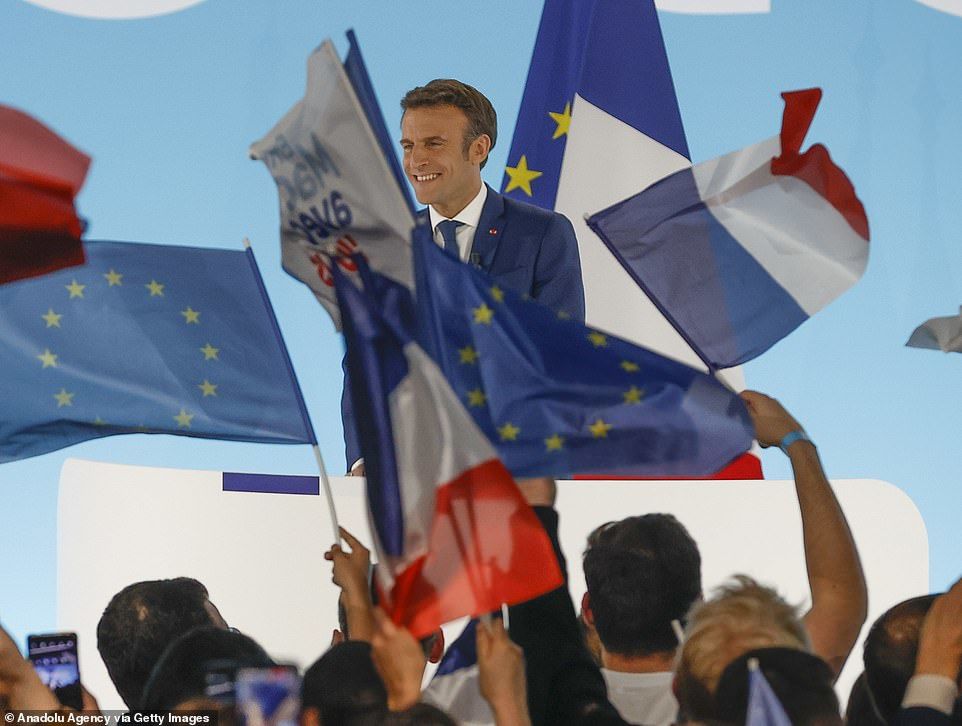 Emmanuel Macron makes a speech as he celebrates
his qualification for the second round during Election evening of the
first round of the presidential elections, at Porte de Versailles
Exhibition Center in Paris, France on April 10
Emmanuel Macron makes a speech as he celebrates
his qualification for the second round during Election evening of the
first round of the presidential elections, at Porte de Versailles
Exhibition Center in Paris, France on April 10
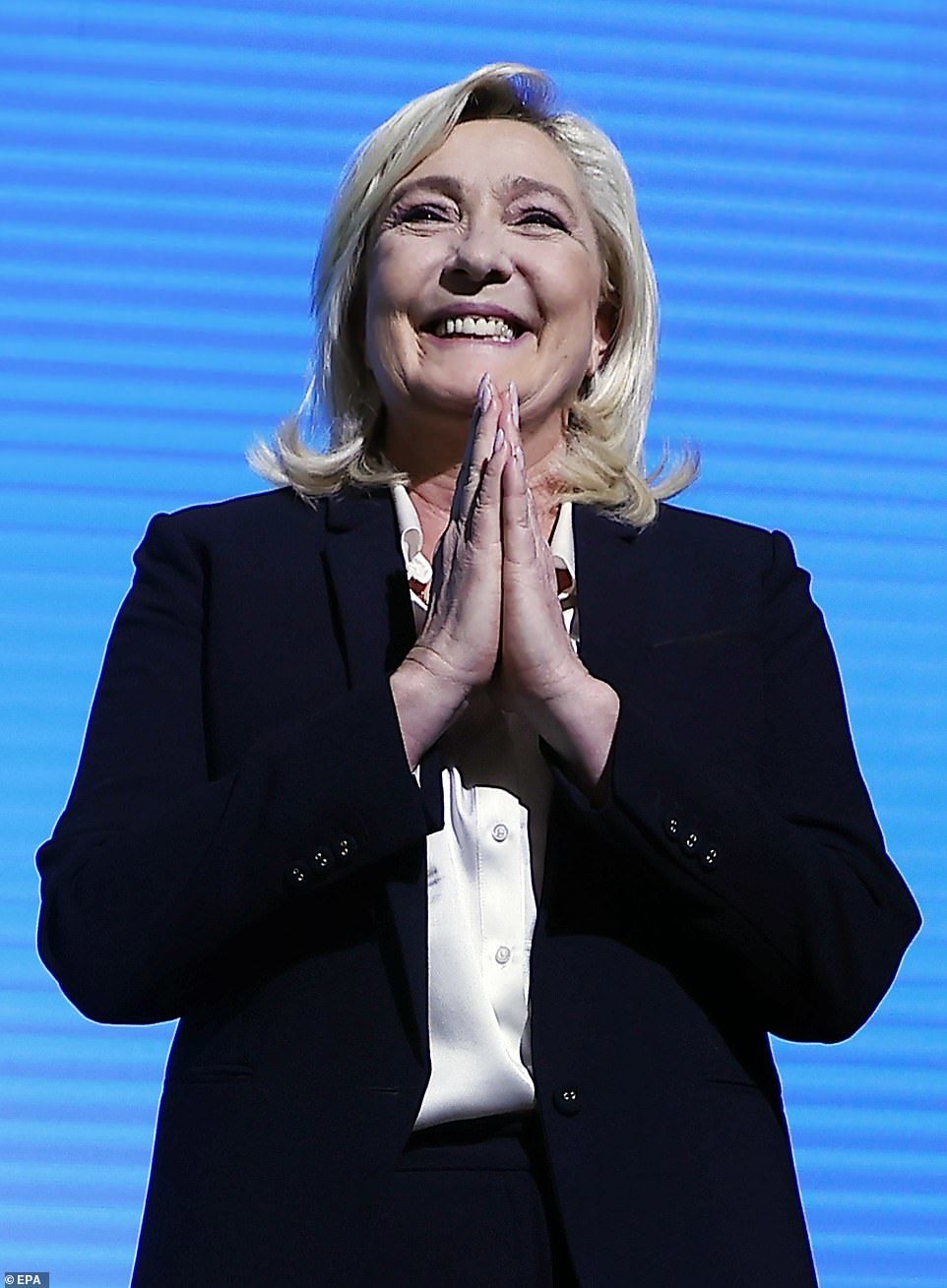 A beaming Marine Le Pen delivered a speech after
results in the first round of the French presidential elections put her
just four per cent behind Emmanuel Macron
A beaming Marine Le Pen delivered a speech after
results in the first round of the French presidential elections put her
just four per cent behind Emmanuel Macron
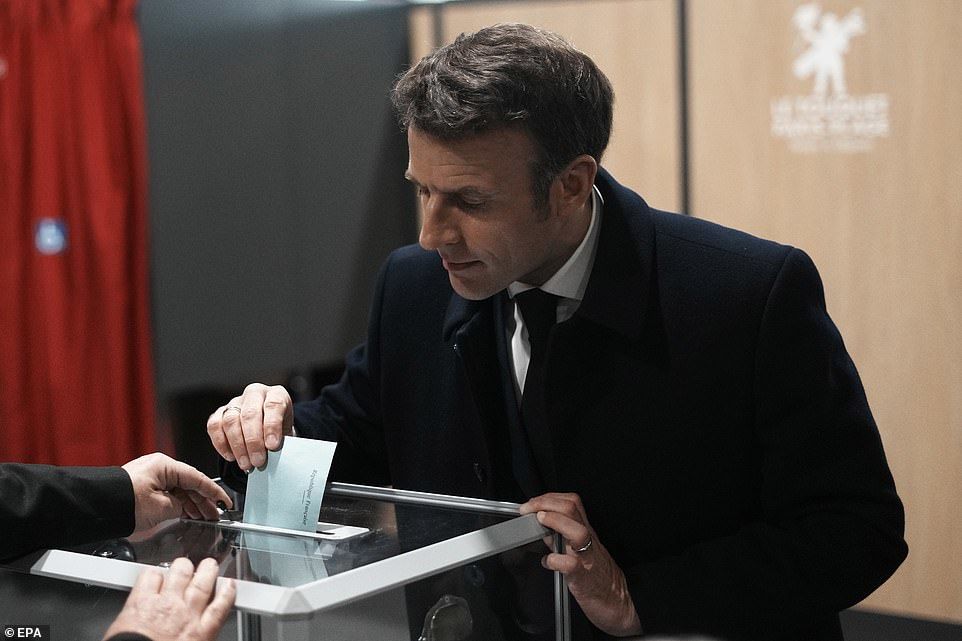 French President Emmanuel Macron casts his
ballot for the first round of the presidential election, in Le Touquet,
Northern France, on Sunday morning amid a surge in support for far-Right
candidate Marine Le Pen
French President Emmanuel Macron casts his
ballot for the first round of the presidential election, in Le Touquet,
Northern France, on Sunday morning amid a surge in support for far-Right
candidate Marine Le Pen
Le Pen is making her third consecutive bid for France's top job after being soundly beaten by Macron in 2017 by 34 per cent to 66 per cent.
The ex-MEP has been trying to 'detoxify' her party in recent years, rebranding it from the National Front to the National Rally the year after her last presidential defeat.
She has ditched her nationalist rhetoric and axed unpopular policies such as quitting the euro.
Instead, the polemicist talks of making workers under the age of 30 exempt from income tax.
Other promises include pulling out of NATO's military structures and scrapping a defence treaty with Britain. Le Pen last night called for unity as she tried to convince voters to hand her the presidency in two weeks.
Her standing has been boosted by the emergence of Right-wing radical Eric Zemmour, who picked up 7.2 per cent of votes. He urged his supporters to 'vote for Marine Le Pen' last night.
The performance by Macron appears to be stronger than predicted by opinion polls in the run-up to the vote.
Barely a month ago, Macron was riding high in polls thanks to strong economic growth, a fragmented opposition and his statesman role in trying to avert war on Europe's eastern flank.
Yet he has paid the price for late entry into the campaign during which he eschewed market walkabouts in provincial France in favour of a single big rally outside Paris.
A plan to make people work longer has also proved unpopular.
By contrast, Le Pen has for months toured towns and villages across France, focusing on cost-of-living issues that trouble millions and tapping into deep-seated anger towards the distant political elite.
A more than 10 point lead Macron had enjoyed as late as mid-March evaporated and voter surveys ahead of the first round showed his margin of victory in an eventual runoff whittled down to within the margin of error.
Far-left candidate Jean-Luc Melenchon was predicted to come third with 19.8 - 20.8 per cent and extreme-right pundit Eric Zemmour on 6.8 - 7 per cent with candidates of the traditional left and right trailing far behind.
Valerie Pecresse from the right-wing Republicans was on 4.3 - 5 per cent, in a disastrous performance by the party of ex-president Nicolas Sarkozy, the projections showed.
Socialist Party candidate Anne Hidalgo was projected to face electoral doom with a score of just 1.8 - 2.0 per cent.
The final-round duel between Macron and Le Pen is however set to be far tighter than the run-off between them in 2017, when the current president thrashed Le Pen with 66 per cent of the vote.
Hidalgo, who polled ninth, said she backed Macron.
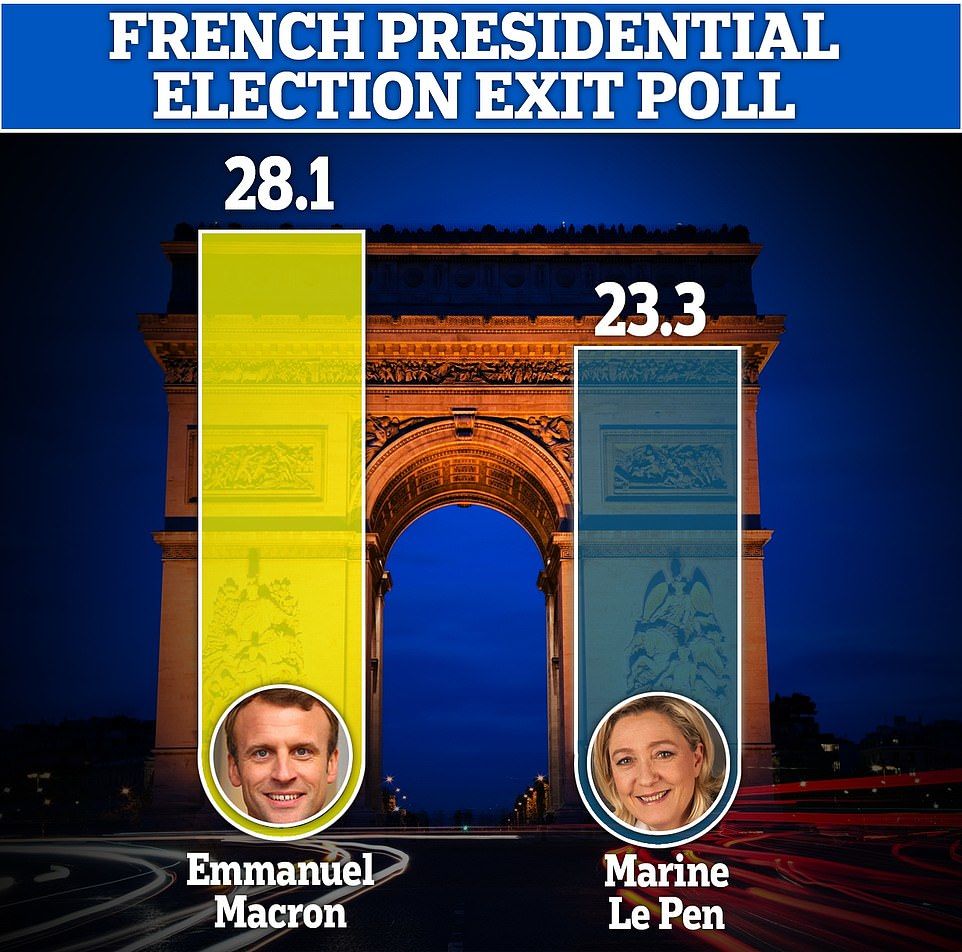 Exit polls separated the two rivals by a handful
of percentage points ahead of second round in two weeks, with the two
candidates neck and neck
Exit polls separated the two rivals by a handful
of percentage points ahead of second round in two weeks, with the two
candidates neck and neck
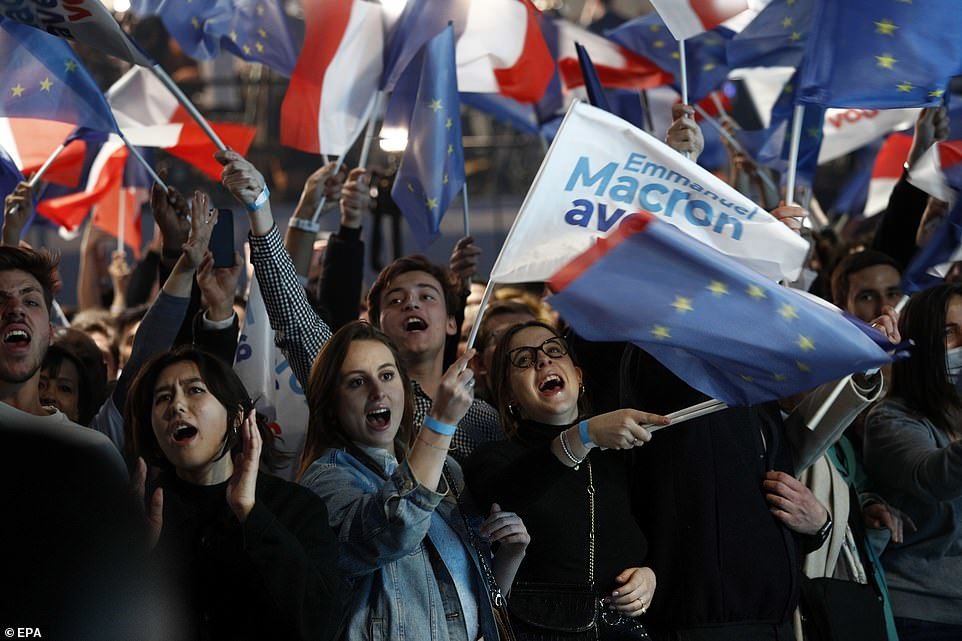 Supporters of French President and candidate for
re-election Emmanuel Macron react after results in the first round of
the French presidential elections in Paris, April 10
Supporters of French President and candidate for
re-election Emmanuel Macron react after results in the first round of
the French presidential elections in Paris, April 10
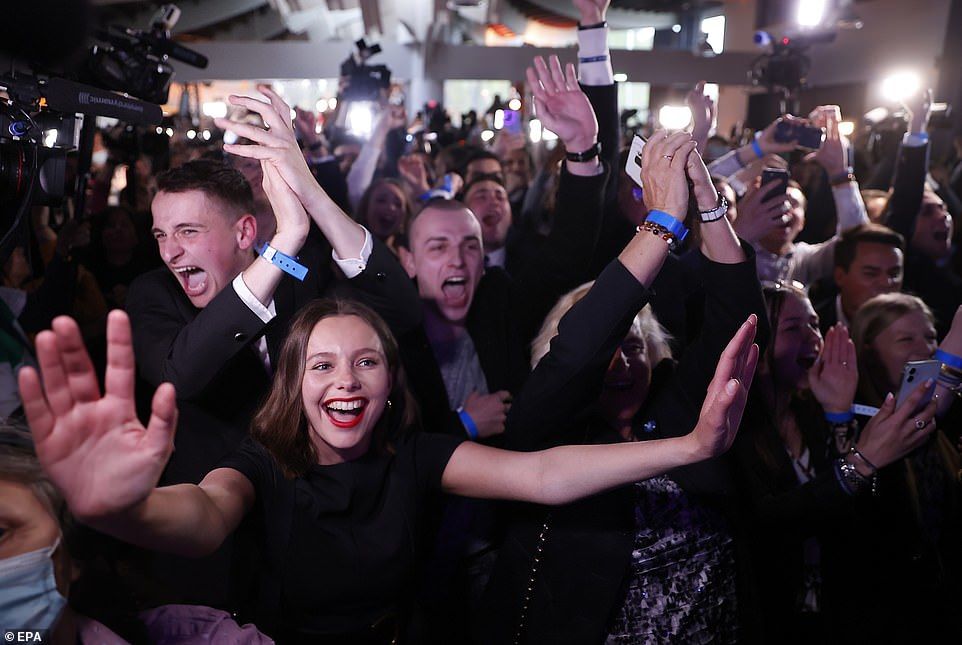 Marine Le Pen's supporters celebrate after
initial exit polls said she received around 24 percent of votes and will
face French President Macron in the second round on April 24
Marine Le Pen's supporters celebrate after
initial exit polls said she received around 24 percent of votes and will
face French President Macron in the second round on April 24
She said: 'So that France does not fall into hatred of all against all, I solemnly call on you to vote on April 24 against the far-right of Marine Le Pen.'
Conservative candidate Valerie Pecresse also said she would vote for Macron, warning of 'disastrous consequences' if he did not win the runoff.
Yet rival far-right candidate Eric Zemmour will reportedly call on his supporters to back Le Pen, Marion Marechal - who is an ally of Zemmour and Le Pen's niece.
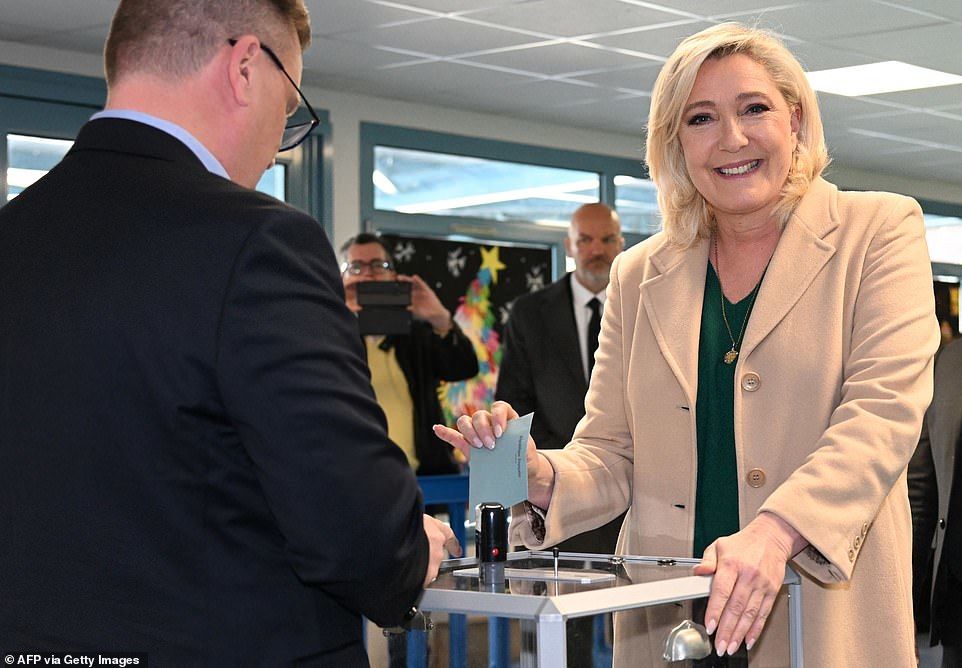 French far-Right presidential candidate Marine
Le Pen casts her ballot next to French far-right Rassemblement National
(RN) mayor of Henin-Beaumont, Steeve Briois, on Sunday morning
French far-Right presidential candidate Marine
Le Pen casts her ballot next to French far-right Rassemblement National
(RN) mayor of Henin-Beaumont, Steeve Briois, on Sunday morning
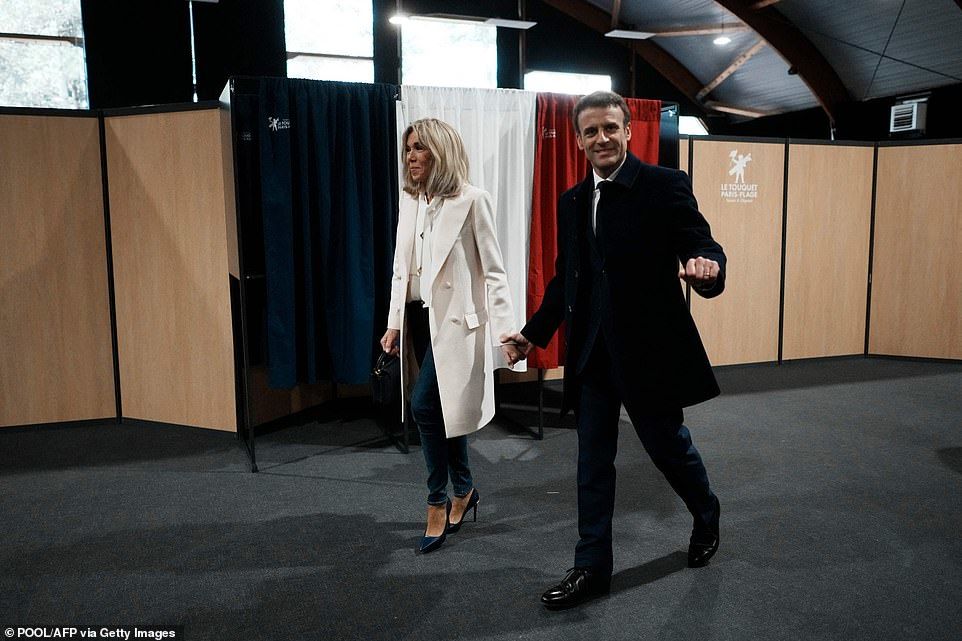 Macron and his wife Brigitte arrive to cast
their ballot for the first round of France's presidential election at a
polling station in Le Touquet, northern France, on Sunday morning
Macron and his wife Brigitte arrive to cast
their ballot for the first round of France's presidential election at a
polling station in Le Touquet, northern France, on Sunday morning
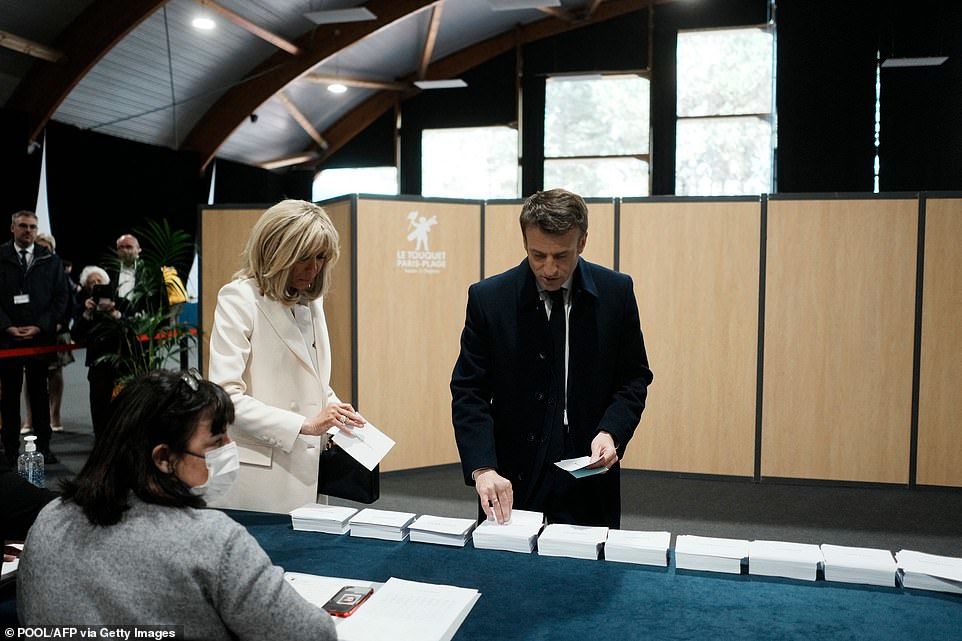 Macron and his wife take ballots before voting
for the first round of France's presidential election at a polling
station in Le Touquet, northern France, today
Macron and his wife take ballots before voting
for the first round of France's presidential election at a polling
station in Le Touquet, northern France, today
 French President and centrist presidential
candidate for reelection Macron leaves the voting booth during the first
round of the presidential election this morning
French President and centrist presidential
candidate for reelection Macron leaves the voting booth during the first
round of the presidential election this morning
 Marine Le Pen, leader of French far-right
National Rally (Rassemblement National) party and presidential
candidate, exits a polling booth to cast her ballot in the first round
of the presidential election today
Marine Le Pen, leader of French far-right
National Rally (Rassemblement National) party and presidential
candidate, exits a polling booth to cast her ballot in the first round
of the presidential election today
 Le Pen is pictured casting her ballot in the
French presidential elections at a polling station in Henin-Beaumont,
northern France, on Sunday morning
Le Pen is pictured casting her ballot in the
French presidential elections at a polling station in Henin-Beaumont,
northern France, on Sunday morning
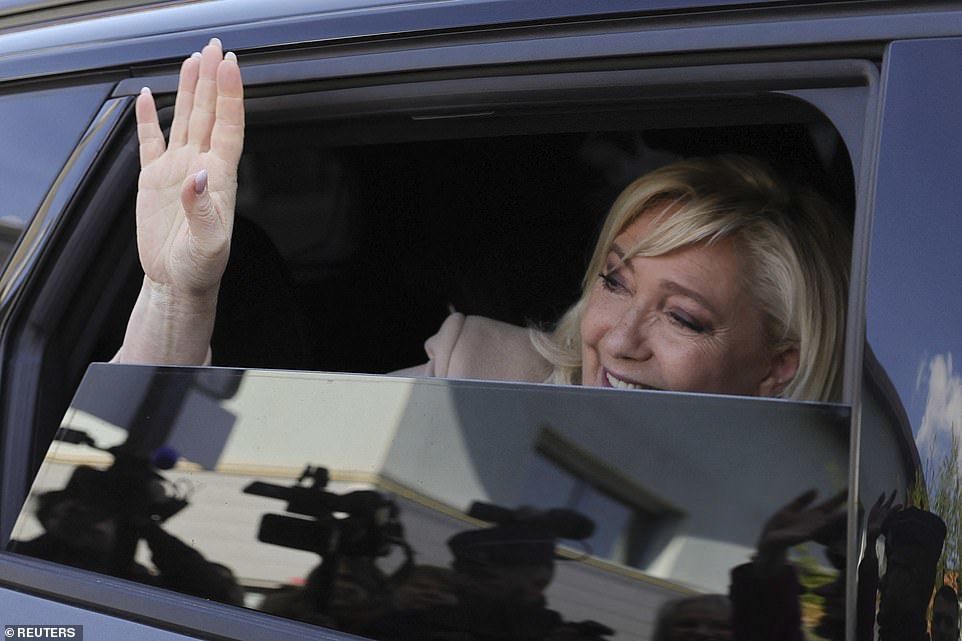 Le Pen, leader of French far-Right National
Rally party and presidential candidate, waves from a car as she leaves
after voting in the first round of the presidential elections
Le Pen, leader of French far-Right National
Rally party and presidential candidate, waves from a car as she leaves
after voting in the first round of the presidential elections
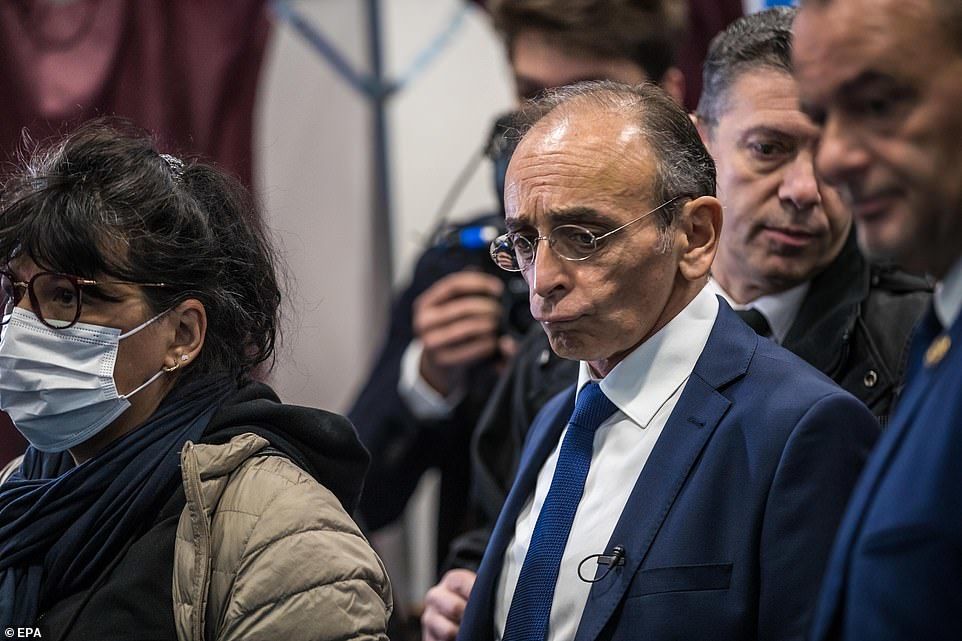 France's far-right party 'Reconquete' leader and
candidate to the 2022 presidential election, Eric Zemmour, arrives to
vote at a polling station in the first round of the French presidential
elections in Paris today
France's far-right party 'Reconquete' leader and
candidate to the 2022 presidential election, Eric Zemmour, arrives to
vote at a polling station in the first round of the French presidential
elections in Paris today
Up to 48million eligible voters have been choosing between 12 candidates. The two with the most votes will battle it out in two week's time in a final election on April 24.
'I'm scared of the political extremes,' said pensioner Therese Eychenne, 89, after voting for Macron in Paris. 'I don't know what would become of France.'
Investors took note of Le Pen's surge. The yield on French 5- and 10-year government bonds hit multi-year highs last week.
A Le Pen victory on April 24 would constitute a similar jolt to the establishment as Britain's Brexit vote to leave the European Union or Donald Trump's 2017 entry into the White House.
France, the EU's second largest economy, would lurch from being a driving force for European integration to being led by a euro-sceptic who is also suspicious of the NATO military alliance.
While Le Pen has ditched past ambitions for a 'Frexit' or to haul France out of the euro zone's single currency, she envisages the EU as a mere alliance of sovereign states.
Who next holds the Elysee Palace will depend on how those who backed Macron and Le Pen's rivals cast their ballots.
In past elections in 2002 and 2017, voters on the left and right have united to block the far-right from power.
However, surveys suggest that the so-called 'republicain front' has crumbled, with many left-wing voters saying they are loathe to endorse a leader they deride as arrogant and a 'president of the rich.'
'We want change, so why not give her a chance [in round two]?' technician Alex Talcone said in the Paris suburb of Bobigny after voting for hard-left candidate Jean-Luc Melenchon.
Each candidate cast their ballots as French voters went to the polls in the presidential elections this morning amid a surge in support for the far-Right candidate.
Participation stood at 25.5 per cent as of midday, the interior ministry said, the lowest level since 2002, which saw a far-right candidate advance to the second-round run-off.
Analysts have warned that turnout this year could be the lowest since direct popular vote of the president was ratified in 1962, injecting a high level of uncertainty into a race where Macron is seeking re-election.
Former conservative president Nicolas Sarkozy and Parti Socialiste candidate Anne Hidalgo were among the first to head to the polls in Paris today.
Macron was later seen arriving with his wife Brigitte at a polling station in Le Touquet, northern France, while his political nemesis Le Pen cast her ballot in Henin-Beaumont, located in the country's Hauts-de-France region.
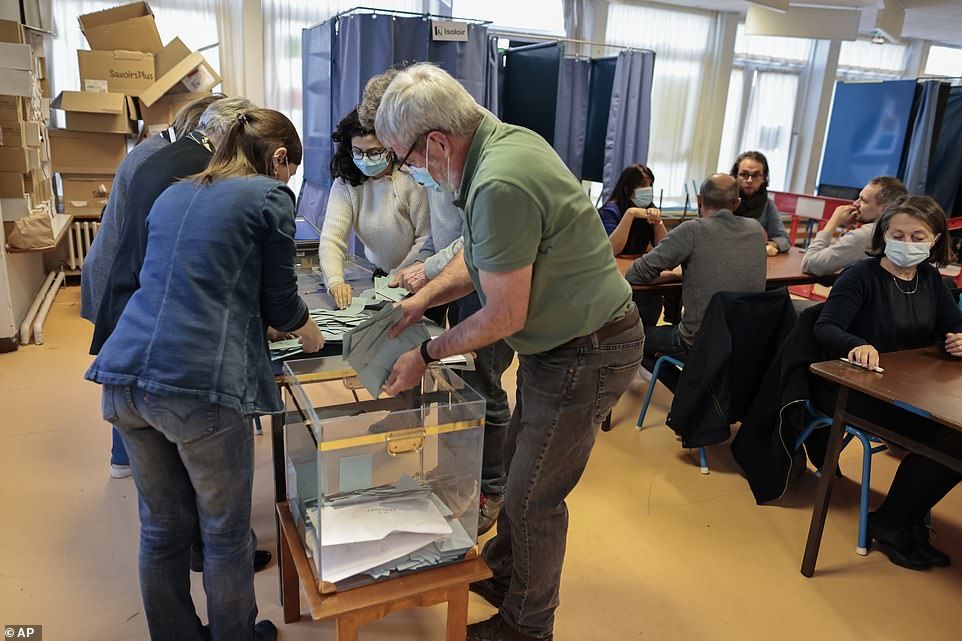 Election officials start the count of ballots
cast in the first round of the presidential election in Nantes, western
France, Sunday, April 10
Election officials start the count of ballots
cast in the first round of the presidential election in Nantes, western
France, Sunday, April 10
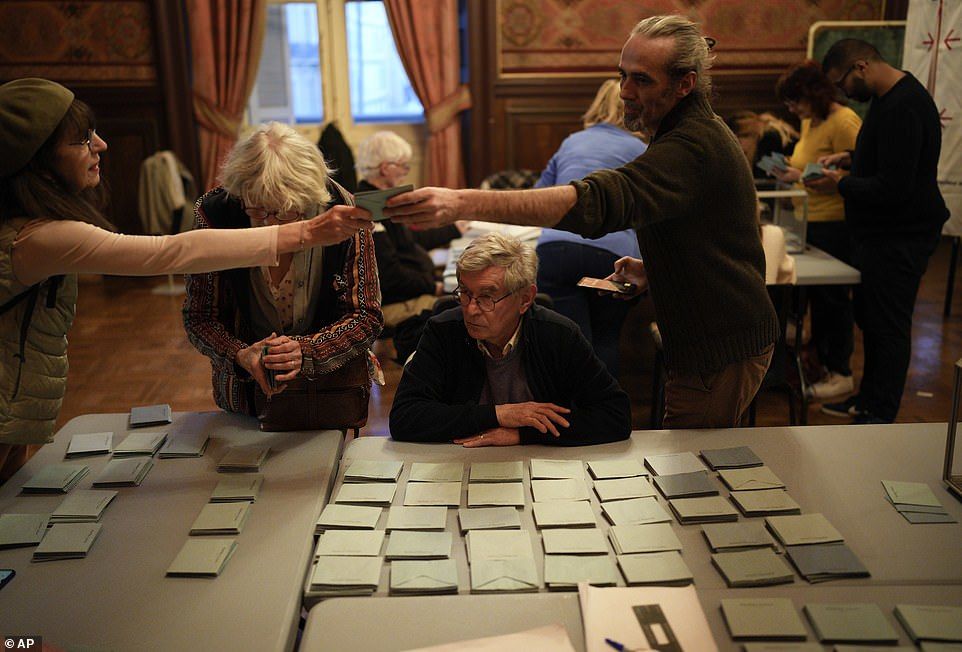 Ballots for the first round of the presidential election are counted in Marseille, southern France, Sunday, April 10
Ballots for the first round of the presidential election are counted in Marseille, southern France, Sunday, April 10
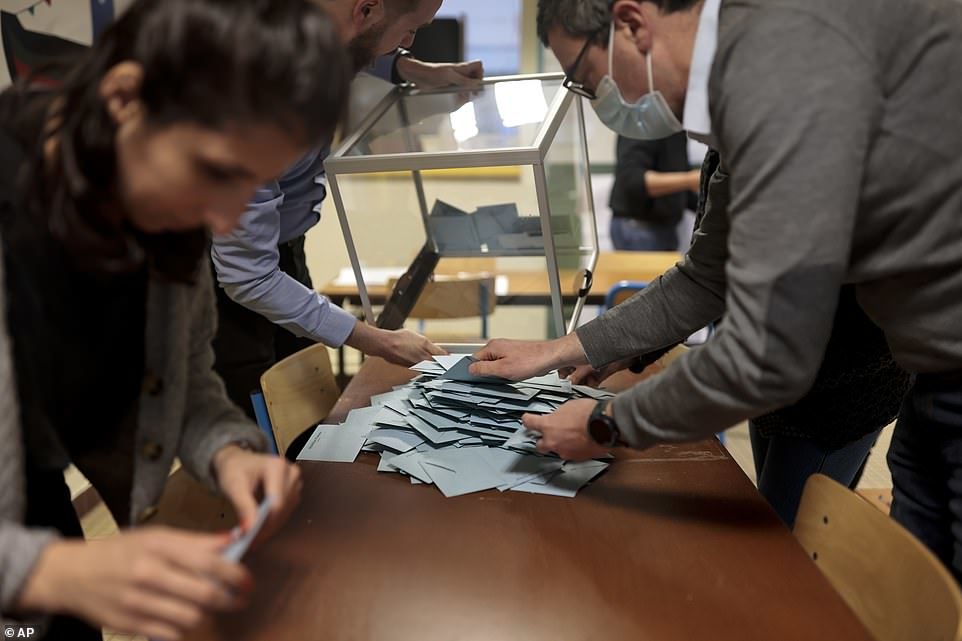 An exit poll put liberal candidate Emmanuel
Macron just four per cent in front of the Marine Le Pen. Macron has
reportedly scored 28.1 per cent in the first round and Le Pen 23.3 per
cent
An exit poll put liberal candidate Emmanuel
Macron just four per cent in front of the Marine Le Pen. Macron has
reportedly scored 28.1 per cent in the first round and Le Pen 23.3 per
cent
Unless someone gets more than half of the nationwide vote, there will be a second and decisive round on Sunday April 24.
Macron, a political centrist, for months looked like a shoo-in to become France's first president in 20 years to win a second term.
But that scenario blurred in the campaign's closing stages as the pain of inflation and of pump, food and energy prices roared back as dominant election themes for many low-income households. They could drive many voters on Sunday into the arms of Le Pen.
A new YouGov survey this week showed that more than half (56 per cent) of voters aged 18 to 24 would back Le Pen, whose National Rally party has vowed to clampdown on immigration, reassert France's national identity and fine Muslims who wear headscarves in public.
Le Pen's campaign has been mired by allegations of racism spread by Macron, and this week hit out at the President's 'extremely outrageous' and 'very aggressive' claims.
If re-elected, Macron would have a five-year mandate to impose his vision of reform which would include a crack at reducing the pension age in defiance of union anger.
He would also seek to consolidate his position as the undisputed number one in Europe after the departure of German chancellor Angela Merkel.
Analysts question whether Macron would enjoy the same support from a broad anti-far right 'Republican front' coalition that helped him win in 2017 and allowed Jacques Chirac to demolish Marine Le Pen's father Jean-Marie in 2002.
The latest prediction suggests that Macron will win 27 per cent of the vote in the first-round election tomorrow, with Le Pen taking 22 per cent.
They would then battle for votes in the lead up to April 24.
Other highly favoured candidates include far-Right politician Éric Zemmour and Left-wing Jean-Luc Mélenchon — particularly for younger voters.
Greens candidate Yannick Jadot, the Republicans' Valerie Pecresse and the flagging Socialist nominee Anne Hidalgo appear certain to be ejected in the first round.
Far-right former TV pundit Eric Zemmour made a re-entry into the campaign last year but lost ground, and analysts say he has aided Le Pen by making her appear more moderate.
Macron has called for a 'mobilisation' of his supporters, and said that Brexit proves that Le Pen could win with her far-Right views.
He also appealed to younger, progressive-leaning voters in his last scheduled interview before Sunday's first-round presidential vote.
'When it comes to correcting social inequalities at their root, we have begun the work, but we are very far from having succeeded,' he told online news outlet Brut in a long interview, pledging also to do more to fight climate change.
One 25-year-old who has been circulating Le Pen leaflets said that her nationalist ideologies appealed to alienated young people.
'Our generation has known all kinds of problems. We've always seen war on the TV,' David Quentin told the Telegraph.
'We've always known economic crisis and terrorism, environmental problems. It's always felt like the end of the world to us. We've lost our point of reference, as a country.'
But this support for Le Pen may not lead to a victory, as a record-breaking 31 per cent of voters may abstain this year.
Young voters are the most likely to steer clear of the ballot box, feeling a disconnect between themselves and the candidates.
Mélenchon, the Left's favourite among the youth vote, has been described as the country's answer to Jeremy Corbyn.
His views have prompted a mixed response among younger people.
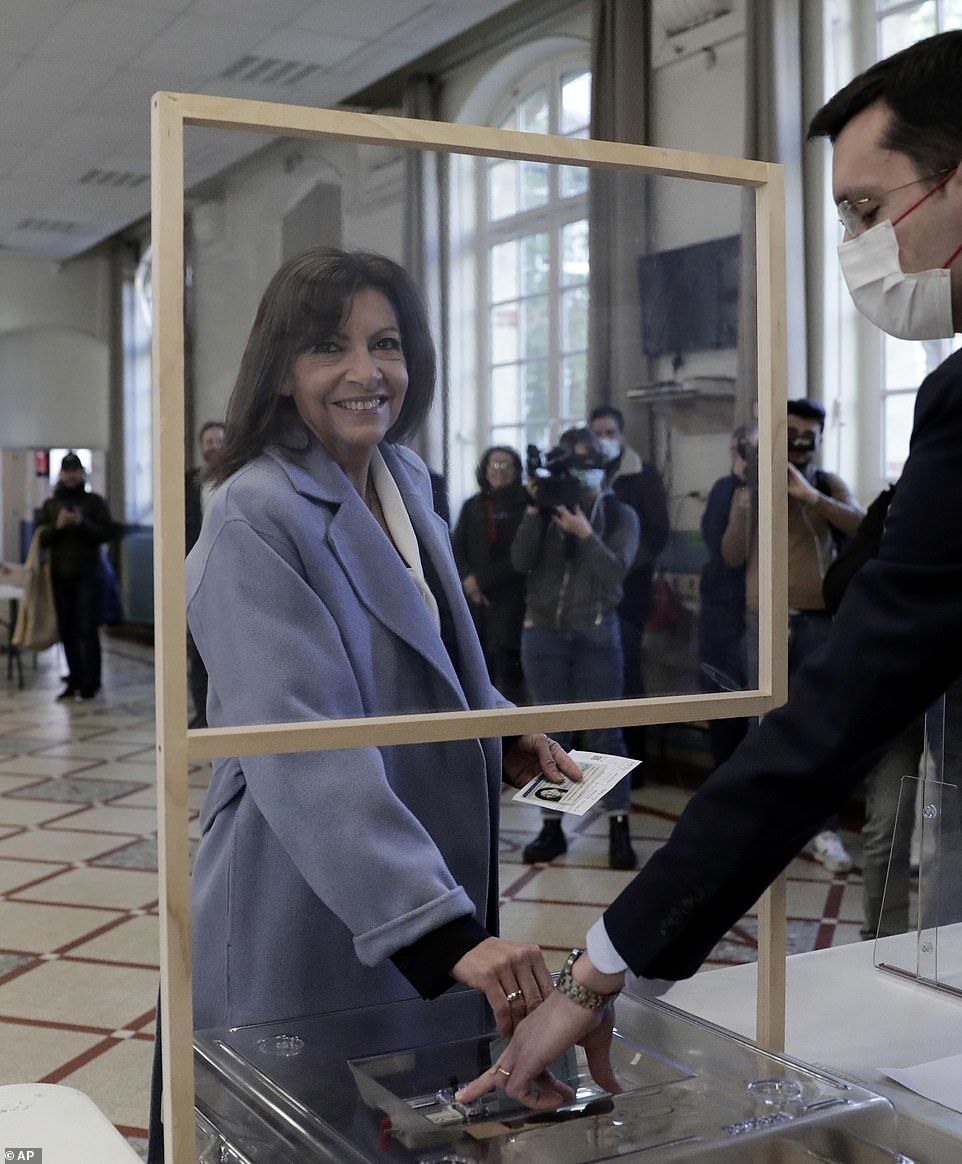 French socialist presidential candidate Anne
Hidalgo casts her vote in the first round of the French presidential
election in Paris, France, on Sunday
French socialist presidential candidate Anne
Hidalgo casts her vote in the first round of the French presidential
election in Paris, France, on Sunday
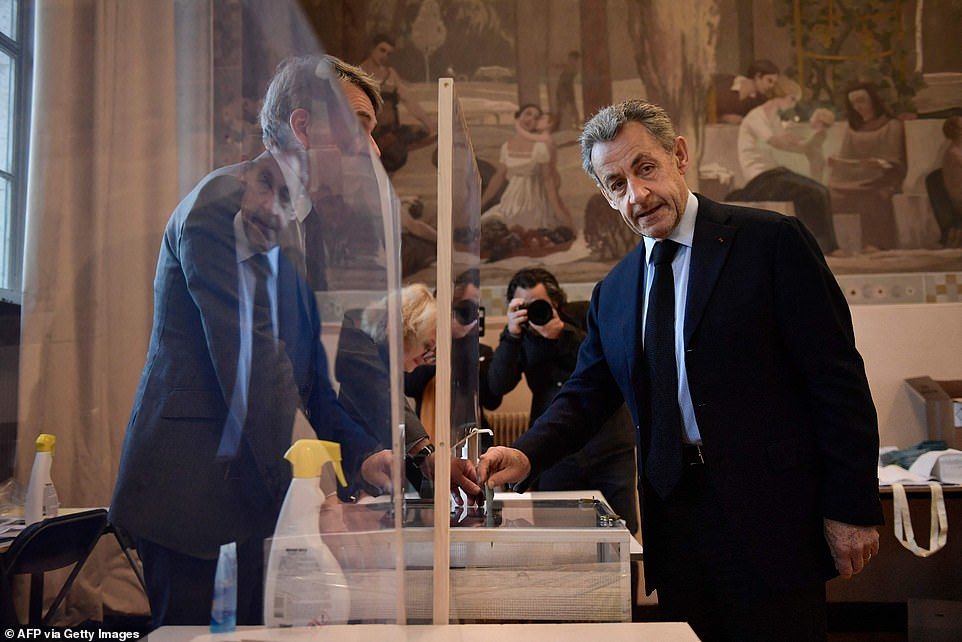 Former conservative president Nicolas Sarkozy
casts his ballot for the first round of France's presidential election
at a polling station in Paris early this morning
Former conservative president Nicolas Sarkozy
casts his ballot for the first round of France's presidential election
at a polling station in Paris early this morning
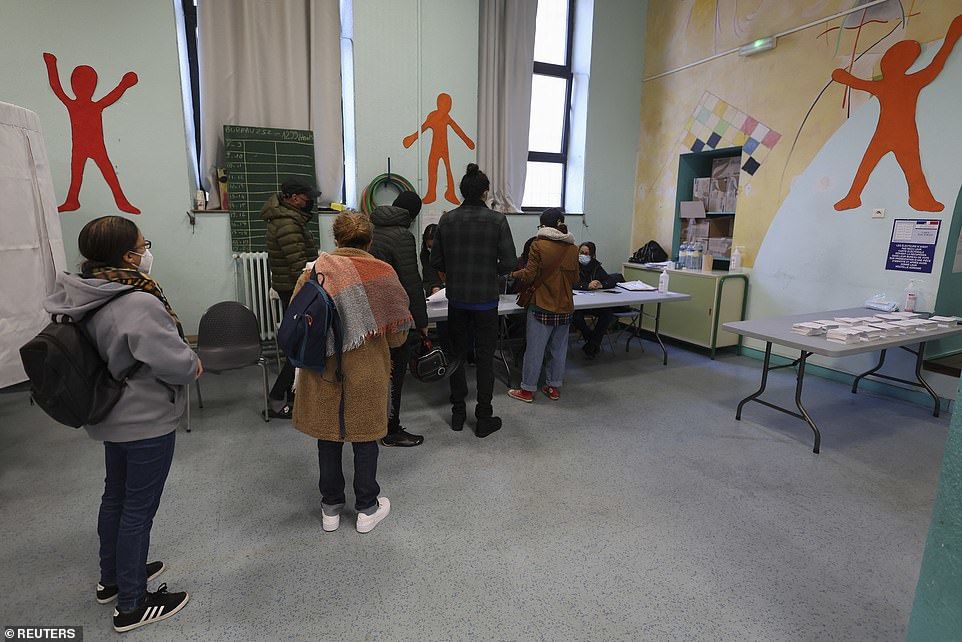 Up to 48 million eligible voters are choosing
one of 12 candidates after polls opened at 8am local time on Sunday.
Pictured: People queuing to vote at a polling station in Marseille today
Up to 48 million eligible voters are choosing
one of 12 candidates after polls opened at 8am local time on Sunday.
Pictured: People queuing to vote at a polling station in Marseille today
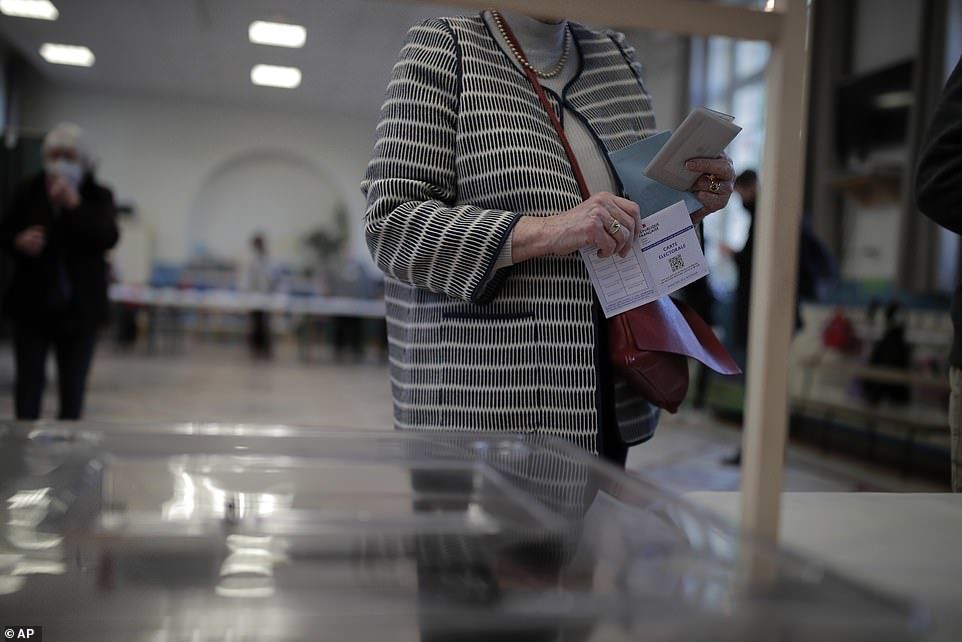 A woman waits to cast her vote in the first round of the French presidential election in Paris, France, early on Sunday
A woman waits to cast her vote in the first round of the French presidential election in Paris, France, early on Sunday
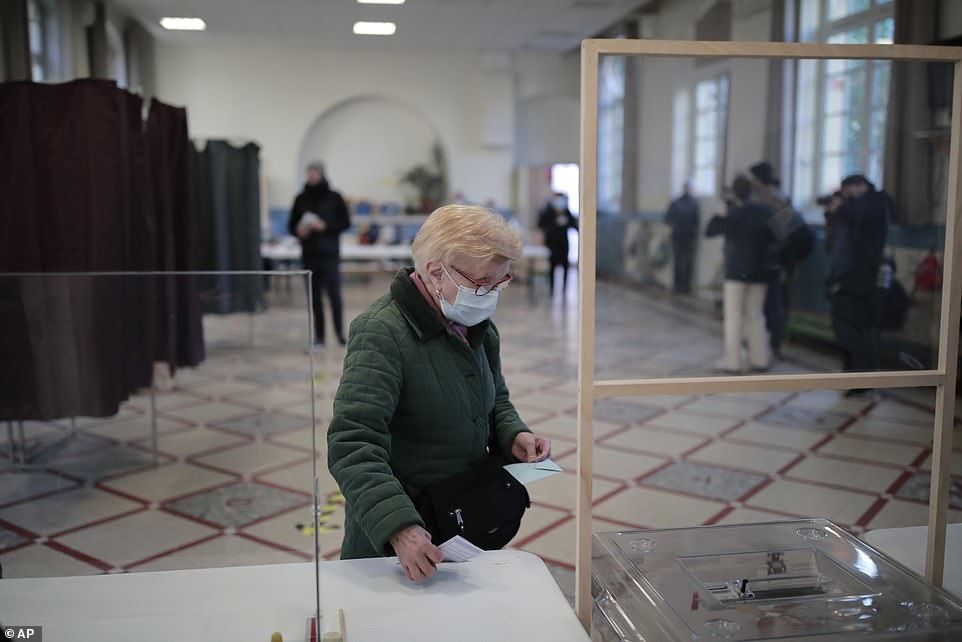 A woman wearing face mask casts her vote in the first round of the French presidential election in Paris early this morning
A woman wearing face mask casts her vote in the first round of the French presidential election in Paris early this morning
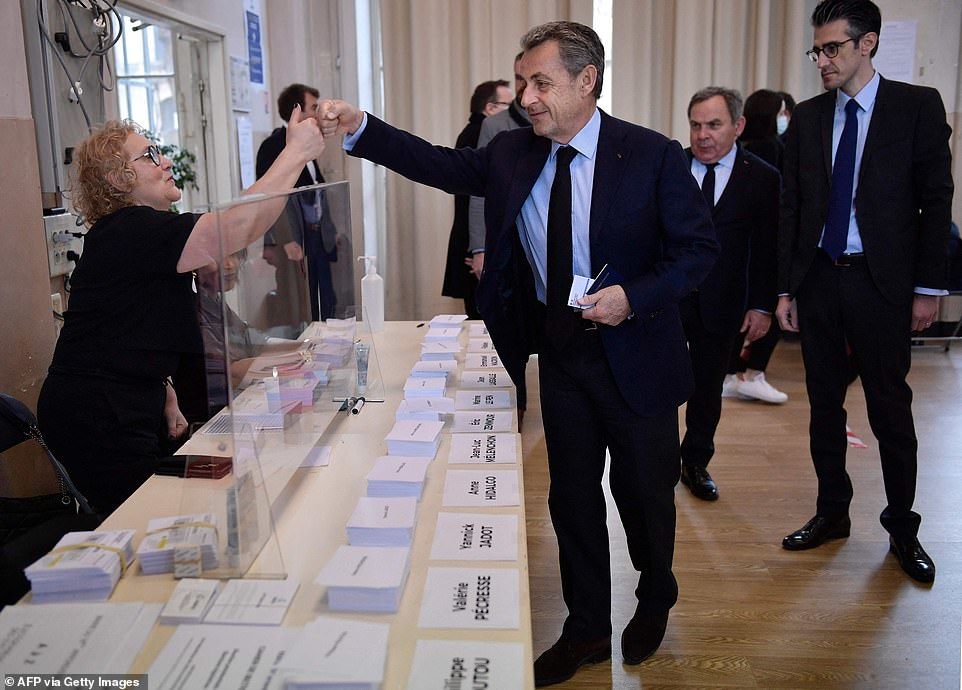 Ex-French President Sarkozy, centre, greets an
electoral official as he casts his ballot for the first round of
France's presidential election at a polling station in Paris today
Ex-French President Sarkozy, centre, greets an
electoral official as he casts his ballot for the first round of
France's presidential election at a polling station in Paris today
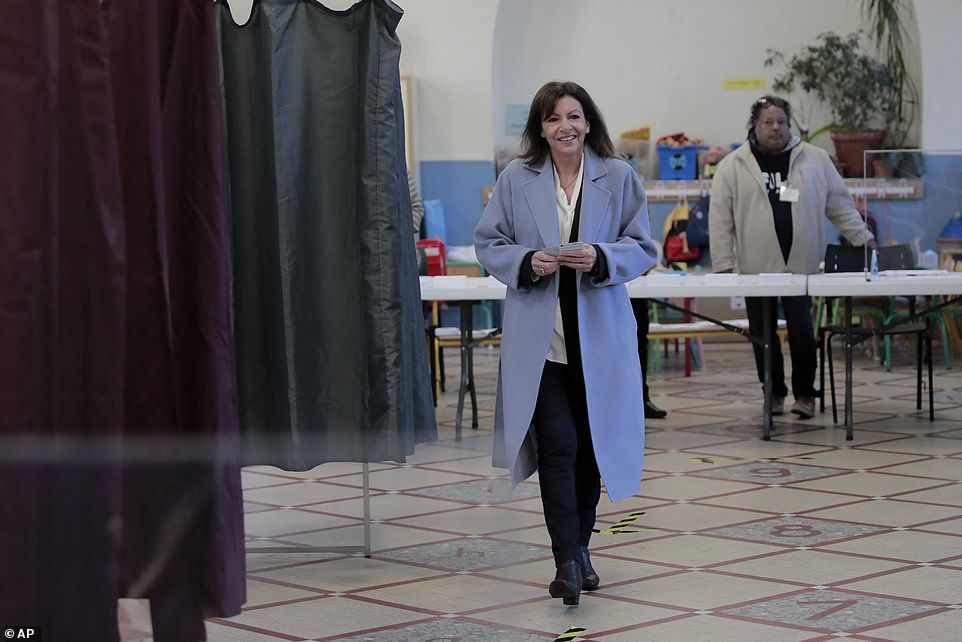 French socialist presidential candidate Hidalgo
arrives to cast her vote in the first round of the French presidential
election in Paris early this morning
French socialist presidential candidate Hidalgo
arrives to cast her vote in the first round of the French presidential
election in Paris early this morning
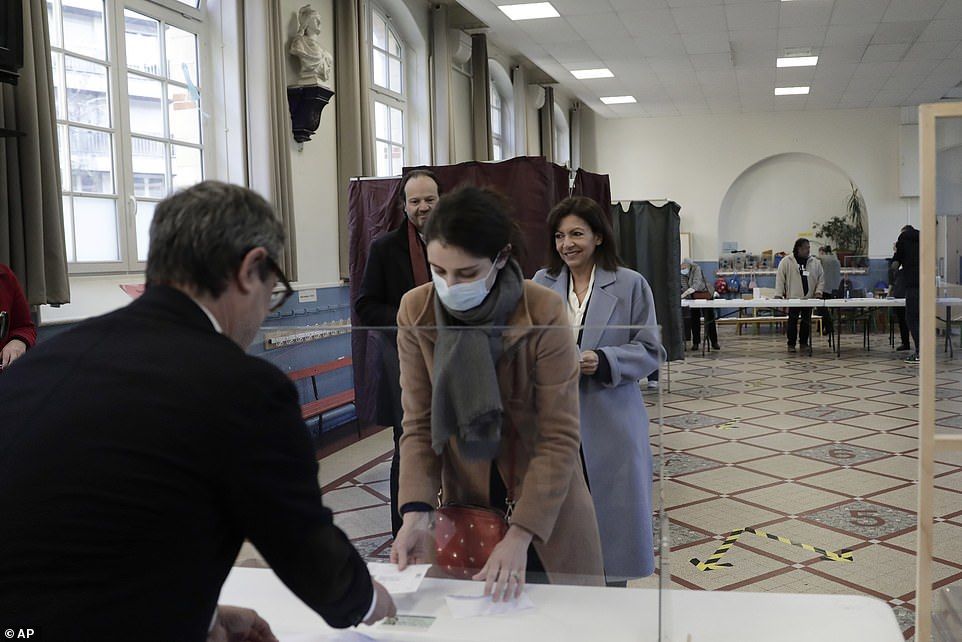 French socialist presidential candidate Hidalgo
queues as she arrives to cast her vote in the first round of the French
presidential election in Paris today
French socialist presidential candidate Hidalgo
queues as she arrives to cast her vote in the first round of the French
presidential election in Paris today
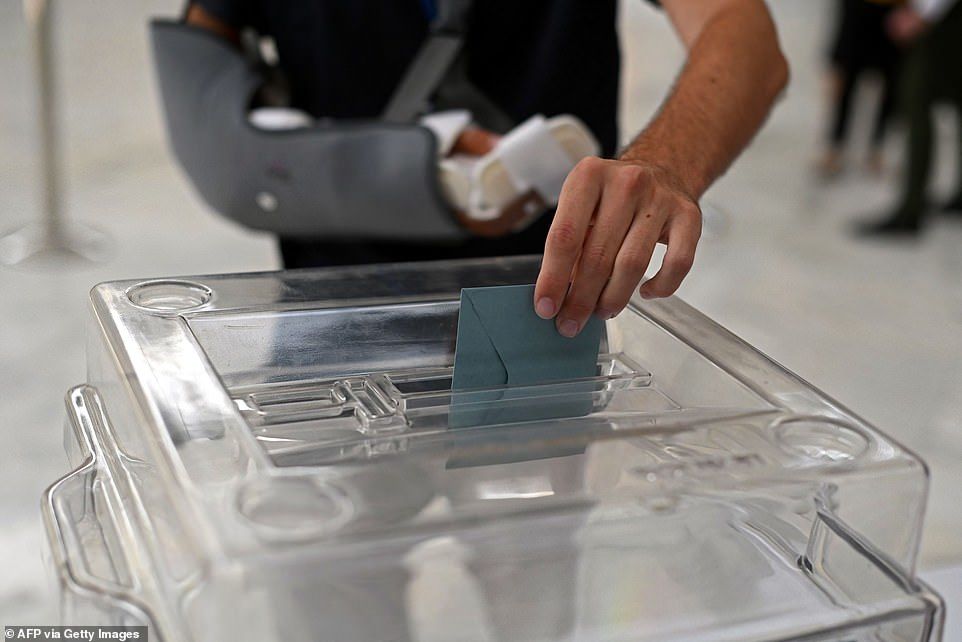 A French national living in India casts his vote
in the first round of the country's presidential elections at the
French embassy in New Delhi on April 10
A French national living in India casts his vote
in the first round of the country's presidential elections at the
French embassy in New Delhi on April 10
One 25-year-old intern told the paper 'the far-Right and the awful candidate just next to it' were both unappealing.
'Going to vote would mean putting my faith in a system that I know can't satisfy my choices, so I'm not very interested in it, Étienne Sellier said.
The biggest voter population expected to take part on Sunday are older and wealthier people. And they are more likely to support Macron.
'There is an uncertainty ahead of the first round,' said French political scientist Pascal Perrineau, pointing to unprecedently high numbers of voters who were still undecided or who changed their minds during the campaign as well as absentee voters.
Analysts fear that the 2002 record of the numbers of French voters boycotting a first round of 28.4 per cent risks being beaten, with the 2017 absentee rate of 22.2 per cent almost sure to be exceeded.
Some 48.7 million voters are registered across France to vote in this election.
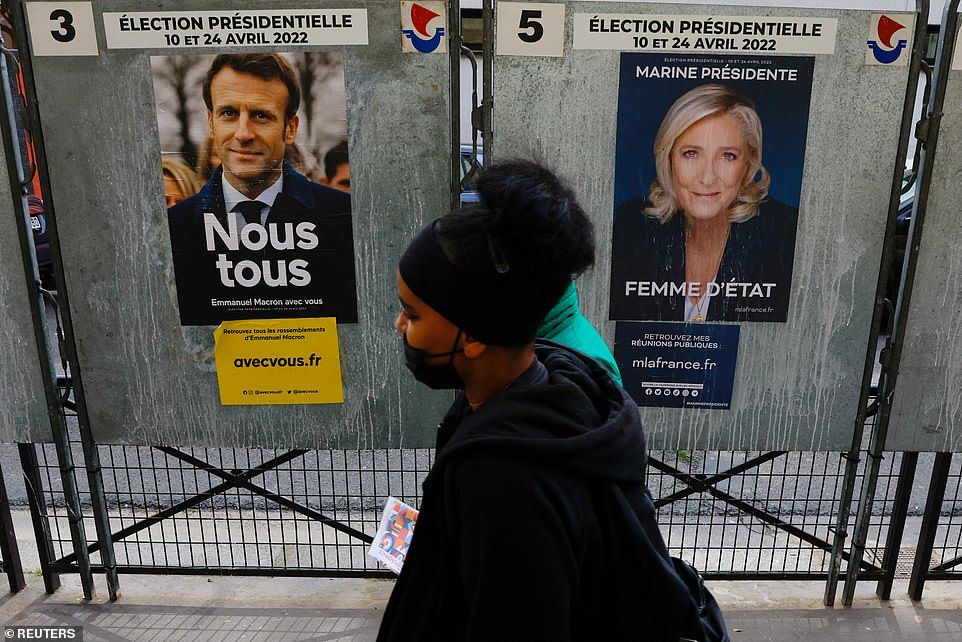 Some younger people feel that both Macron and Le
Pen are unappealing, as a record-breaking 31 per cent of voters may
abstain this year
Some younger people feel that both Macron and Le
Pen are unappealing, as a record-breaking 31 per cent of voters may
abstain this year
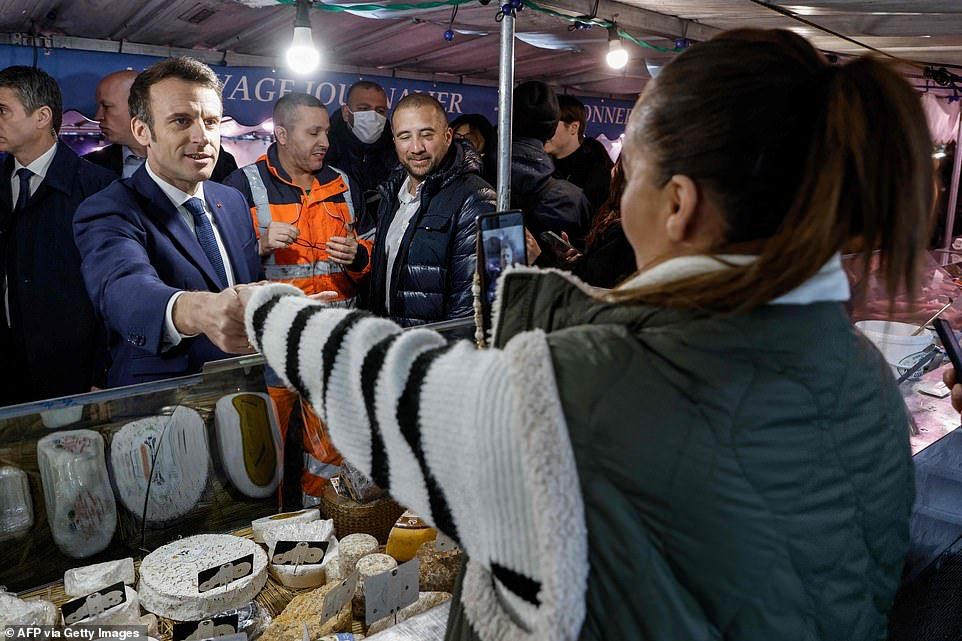 Macron visited a market in Neuilly-sur-Seine,
near Paris yesterday after a radio appearance on the last day of
campaigning ahead of the vote tomorrow
Macron visited a market in Neuilly-sur-Seine,
near Paris yesterday after a radio appearance on the last day of
campaigning ahead of the vote tomorrow
Frederic Dabi, director of the Ifop polling institute, said: 'We have experienced a strange campaign that was at odds with what we experienced in the past presidential elections.'
All further political activity by candidates was banned on the final day before polls open in mainland France.
French overseas territories began voting earlier to take account of the time difference, starting with the tiny island of Saint Pierre and Miquelon off the coast of Canada whose voters cast ballots from 10am today.
Territories in the Caribbean followed a few hours later, with Pacific island voters casting their ballots from 6pm and then finally the Indian Ocean territories before polling stations open in mainland France.
Macron has argued that he is the best person to lead the country during the Ukrainian war, but has been less active on the campaign trail than Le Pen.
This has boosted the far-Right candidate, whose poll ratings have been mostly impacted by the Russian loan her party is repaying and her previous support of Putin's annexation of Crimea.










